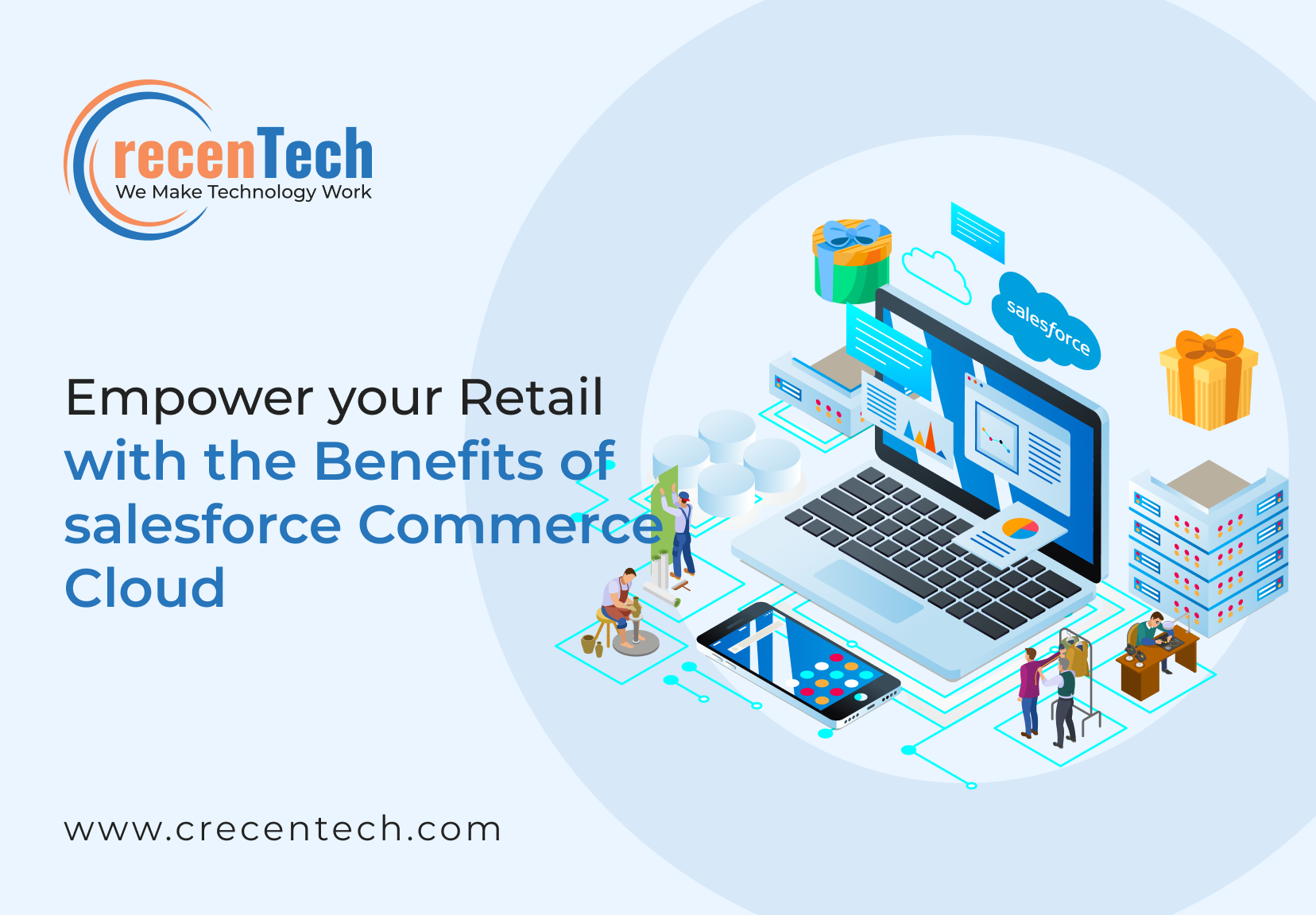Catch Up With Our Business Handlers to Discover Efficient Solutions.
Get Started 
Catch Up With Our Business Handlers to Discover Efficient Solutions.
Get Started 

05-Nov-2024
As more people purchase online and seek more individualized experiences, the retail sector is going through a rapid transition. This growth is being fueled by consumers who prefer mobile devices and online shopping; this comes up with both opportunities and challenges for sellers.
Retailers must have a thorough awareness of each customer's unique needs to satisfy these requests. Salesforce's Data Cloud can help with this.
To stay competitive, merchants need to increase their digital presence and enhance customer satisfaction. The days of managing complicated tools with standard retail features are long gone. Stores may find it challenging to connect with customers due to fragmented platforms, rigid systems, and big data.
The capability of Salesforce Commerce Cloud enables shops to draw in new clients and enhance the consumer experience. This cloud-based technology provides a smooth online, mobile, social, and in-store shopping experience. In this article, we'll discuss the strong points of SFCC and how it can revolutionize your retail enterprise.
Demandware, a cloud-based platform for online e-commerce companies, was the official name of SFCC. It gave businesses permission to run and open online stores, giving customers a reliable buying experience. Companies can use this to manage both their online and in-store operations from a single platform and gain insight into the shopping habits and viewpoints of their customers. This platform keeps clients interested throughout the purchasing process by ensuring a consistent shopping experience across several channels of choice.
Salesforce’s AI, Einstein, enhances SFCC by providing actionable insights into customer behavior and automating tasks like product recommendations, inventory forecasting, and personalized promotions.
Businesses can use Salesforce development services and Einstein AI capabilities to suggest the best products to customers at various touchpoints, elevating personalized offerings and assisting companies in converting haphazard shoppers into devoted clients.
Einstein AI also automates various eCommerce tasks, saving a significant amount of time, effort, and related expenses. To boost productivity, the saved resources can be used in other areas. Einstein AI's data-driven insights, real-time forecasts, and efficient workflow are vital features supporting company growth and long-term success.
No matter how a customer interacts with a brand, Salesforce Cloud serves as a centralized platform for companies to handle all their operations, including tracking shipments, inventory management, customer data, and more, to guarantee a smooth experience for both clients and companies. Efficiency is increased because of the requirement to maintain fewer systems.
SFCC guarantees customers a consistent trip by delivering a uniform experience across web, mobile, social, and in-store channels. For example, you own a business that sells accessories for smartphones online. You will have access to all shop-related data on a single platform after Commerce Cloud is deployed for your store.
To maintain precise stock levels, the inventory updates itself wherever a consumer puts an order. Shipping packages and labeling information can be automatically generated by the system, saving human labor. Your support executive may quickly access client data from Commerce Cloud to provide dependable assistance if a customer contacts the support team with a problem.
Commerce Cloud is the best option for dynamic eCommerce enterprises. It provides an easily scalable infrastructure to accommodate growing corporate needs. As a result, you have an eCommerce solution that can quickly scale up its capabilities to guarantee continuous operations as your business expands.
Salesforce Commerce Cloud (SFCC) offers a mobile-friendly approach tailored to today’s mobile-first shoppers, providing responsive design, Progressive Web Apps (PWAs), and Accelerated Mobile Pages (AMP) for seamless, fast-loading experiences across devices. With mobile-optimized search, navigation, and one-click payment integrations like Apple Pay and Google Pay, SFCC ensures streamlined shopping and faster checkouts. This mobile-centered strategy helps retailers meet customer expectations on the go, driving higher engagement and conversion rates in an increasingly mobile-driven market.
SFCC helps retailers enter foreign markets with ease and provides customers with a customized, localized experience.
Retailers offer region-specific language and currency options using SFCC. Its multi-language and multi-currency capabilities improve accessibility and consumer interaction.
Additionally, the platform allows for region-specific pricing, promotions, and content, which helps retailers stay relevant and better engage local audiences.
Salesforce Commerce Cloud offers tailored solutions for a variety of business models that are uniquely designed to optimize operations and enhance customer experiences.
These Salesforce solutions provide a robust foundation for businesses across different sectors, enabling them to adapt, grow, and deliver exceptional, data-driven shopping experiences.
So, we established that Salesforce Commerce Cloud is a robust suite of tools and capabilities designed to enhance business growth and success in the digital marketplace. By leveraging its extensive features, organizations can deepen customer engagement, tap into new revenue streams, and achieve sustainable success.
With its powerful analytics, robust security, and seamless integration across channels, SFCC equips businesses with all the essentials for a cohesive and dynamic shopping experience.
To conclude, we hope this guide has offered valuable insights into Salesforce Commerce Cloud and its significant advantages in the digital era. Ultimately, Commerce Cloud proves to be a comprehensive and resilient eCommerce solution with in-built customer segmentation and personalization options. Choosing SFCC will hinge on each business’s unique needs, priorities, and the degree of customization required to align with evolving customer preferences.